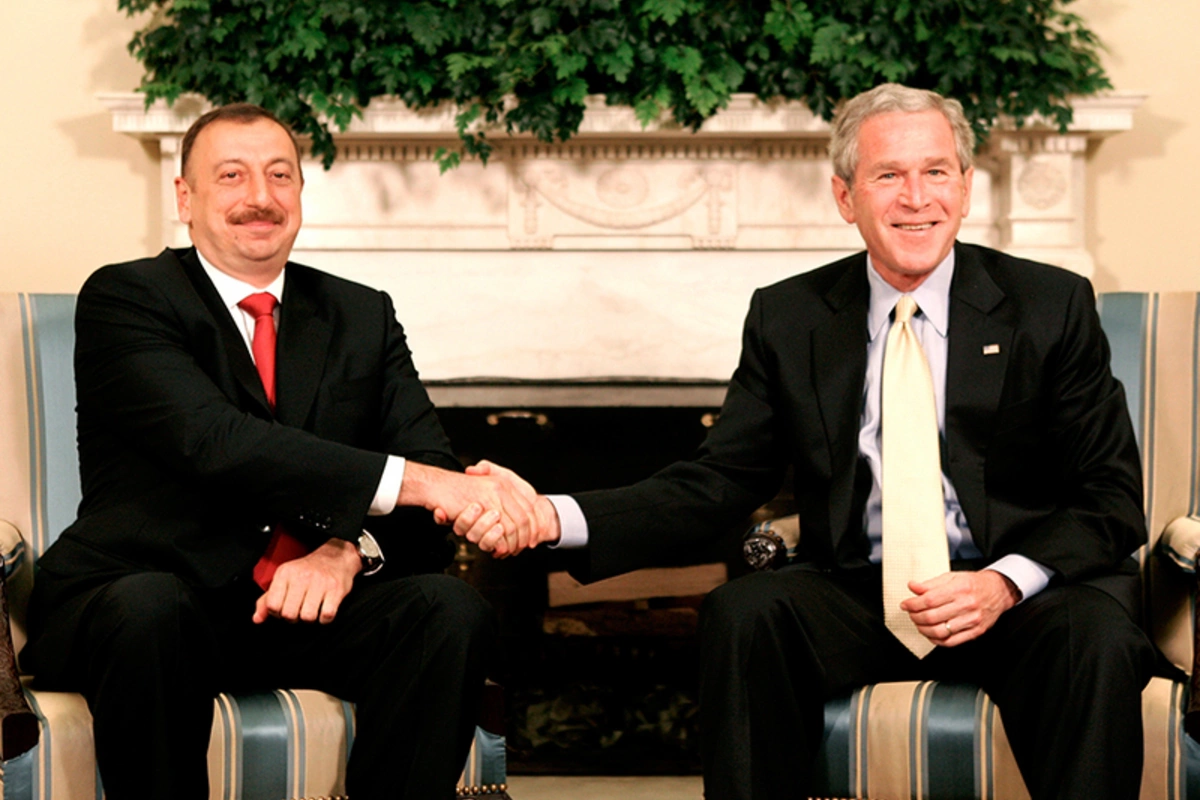
Section 907 has been waived annually for the last 19 years. It's time for repeal.
Azerbaijan President Ilham Aliyev (L) meets with U.S. President George W. Bush in the Oval Office of the White House in Washington, April 28, 2006. Aliyev was in Washington on an official visit. Image: REUTERS/Jason Reed
Three countries in the South Caucasus emerged from the 1991 breakdown of Soviet hegemony: Armenia, Azerbaijan, and Georgia. Seizing the opportunity, US President George H.W. Bush asked Congress in 1992 to authorize a multi-billion-dollar assistance program for all post-Soviet countries. It was called the Freedom Support Act.
But Armenians in the United States effectively lobbied Democrats Tip O’Neil and John Kerry to block aid to their old enemy Azerbaijan. The result was the notorious Section 907 of the Freedom Support Act, forbidding US Government aid to Azerbaijan. Kerry justified the sanction on Azerbaijan, claiming that Baku blocked Armenia by cutting rail links between the republics. This ignored the blockade imposed by Armenia upon Azerbaijan’s disconnected exclave Nakhchivan. It also ignored the fact that, by the time Congress passed the Act in 1992, Armenia and Azerbaijan were essentially at war. The result was the passing of a patently unfair measure that discriminated against Azerbaijan.
Then United States President George W. Bush declared war on Afghanistan. American access to Afghanistan would be greatly facilitated by Baku’s permission to access its airspace. So, Section 907 was given a waiver as the US flew tons of supplies and thousands of troops through Azerbaijani air corridors. Waivers continued, becoming an annual formality as Azerbaijan later went on to contribute troops for US-led stabilization forces in Iraq, South Sudan, and Afghanistan.
Seen dispassionately from purely national self-interest, it is hard to understand why the US wouldn’t support Azerbaijan over Armenia, a country whose various alliances may not appear to immediately chime with US interests. For example, Armenia’s trade relations with Iran have been eyed with suspicion as assisting Tehran’s by-passing of sanctions. The presence of a huge Russian base on Armenian soil allows Moscow to project military support to the Assad regime in Syria, badly complicating US diplomacy there. Thousands of Armenians, having fled ISIS attacks in Syria, were settled by Armenia in Karabakh.
Yet, because of the power of the diaspora lobbies, Section 907 continues, albeit with that annual waiver. Typically, the US Congress nods through the waiver without great fanfare. But in 2020, Armenia’s defeat in the 2nd Karabakh War led to a renewed attempt by diaspora groups to cancel the waiver. The lobby group ANCA (the Armenian National Committee of America) has even suggested that aid due to be sent to Azerbaijan be rerouted instead to Armenia: about 100 million US dollars, adding to a vast sum that Armenia has already received: over $2 billion since 1992.
It’s worth noting that despite its open objectives, ANCA is not registered as a foreign agent under the Foreign Agents Registration Act – which means the U.S. Justice Department permits this lobby to operate. Though US-based, it behaves, closely aligning its activities with successive Armenian governments, as an agent of a foreign nation. ANCA is the lobbying arm of the radical Armenian Dashnak party, one of many groups that joined former president Robert Kocharyan’s Armenia Alliance, whose demands appear to include a revenge war against Azerbaijan.
So, events have made Section 907 obsolete while the ANCA Armenian lobby represents a dangerous irritant to restoring a lasting peace between the two countries.
Retracing missteps can be costly. After paying a high price, Azerbaijan has restored its territorial integrity and offered an “olive branch,” including sharing deliberations and perhaps, decisions, on a new six-power regional committee. The Shusha Declaration offers a way forward where Turkey and the other partners can offer support and balance. After paying a much higher price, Armenia has voted, now, for a future of calm and reconstruction. If local powers can make such progress, it is time for the greater powers, in this case, the United States, to go back and remove any policies that would come back to sting in the future.
Will Congress repeal Section 907? Sadly, the US seems too paralyzed by its current divisions and domestic distractions to act immediately. But 907 is a thorn in the side of Caucasian diplomacy, and if American leaders are serious about taking a stronger stand for peace – and against growing Russian influence in the Caspian - then it should be ditched.
Share on social media